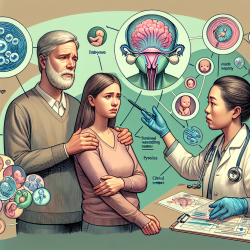Introduction
Depression is a common comorbidity in patients with dermatologic conditions such as acne vulgaris, atopic dermatitis, psoriasis, and hidradenitis suppurativa. Despite this, there is a significant gap in training dermatology residents on depression screening. A recent study titled Dermatology Resident Training on Depression Screening: A Cross-Sectional Survey highlights the need for improved education in this area. This blog explores how practitioners can enhance their skills by implementing the findings of this research.
Key Findings from the Research
The study surveyed 56 dermatology residents across the United States to assess their training and comfort levels in screening for depression among patients with various dermatologic conditions. The key findings include:
- Depression screening was deemed most important for patients with acne vulgaris, psoriasis, and hidradenitis suppurativa.
- Confidence in screening was generally low across all conditions, with most residents only occasionally screening for depression.
- 64% of participants reported that depression screening is not included in their residency curriculum, while 23% were uncertain.
- Barriers to screening included lack of time (61%), discomfort due to lack of training (45%), and concerns about liability (30%).
Recommendations for Practitioners
Based on these findings, practitioners can take several steps to improve their skills in depression screening:
1. Advocate for Curriculum Changes
Given that a majority of residents reported a lack of training, advocating for the inclusion of depression screening in the dermatology residency curriculum is crucial. This can be achieved through discussions with program directors and curriculum committees.
2. Utilize Available Screening Tools
Familiarize yourself with various depression screening tools such as the Patient Health Questionnaire-9 (PHQ-9), Beck Depression Inventory (BDI), and Hospital Anxiety and Depression Scale (HADS). Implementing these tools can standardize the screening process and improve accuracy.
3. Collaborate with Mental Health Professionals
Collaboration with psychiatrists and psychologists can provide additional training and support. This interdisciplinary approach can help in better recognizing and managing the mental health comorbidities associated with dermatologic conditions.
4. Address Barriers to Screening
Identify and address the barriers that prevent effective screening. For instance, integrating brief screening tools into routine consultations can mitigate time constraints. Additionally, training sessions can alleviate discomfort and improve confidence in screening.
5. Engage in Continuous Learning
Stay updated with the latest research and guidelines on depression screening in dermatology. Participating in workshops, webinars, and conferences can provide valuable insights and enhance your skills.
Encouraging Further Research
While this study provides valuable insights, it also highlights the need for further research. Larger studies with diverse geographic representation can provide more comprehensive data. Additionally, exploring the effectiveness of different screening tools and training methods can help in developing best practices.
Conclusion
The research underscores the importance of depression screening in dermatology and the need for improved training. By advocating for curriculum changes, utilizing screening tools, collaborating with mental health professionals, addressing barriers, and engaging in continuous learning, practitioners can enhance their skills and provide better care for their patients.
To read the original research paper, please follow this link: Dermatology Resident Training on Depression Screening: A Cross-Sectional Survey.










